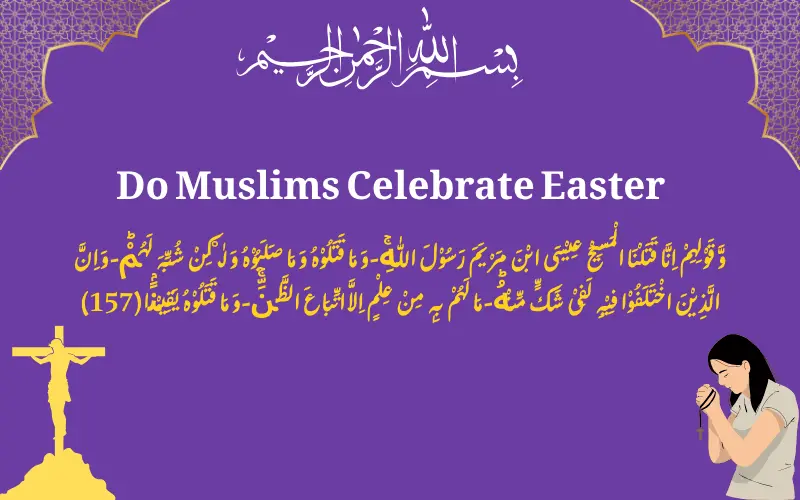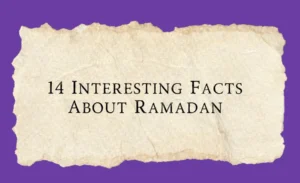In an increasingly globalized world, religious festivals like Easter are celebrated and acknowledged across diverse societies. For many Muslims living in multicultural environments, whether in the West or among Christian-majority communities, questions often arise: Do Muslims celebrate Easter? Is it permissible in Islam to join Easter festivities like egg hunts, Sunday services, or exchanging greetings such as “Happy Easter”?
These questions are not only relevant socially, but spiritually significant. Understanding the Islamic stance on Easter requires a deep dive into the Qur’an, the teachings of Prophet Muhammad ﷺ, and the consensus of Islamic scholars. Unlike secular holidays, Easter is rooted in Christian theology, specifically the belief in the crucifixion and resurrection of Jesus (Isa عليه السلام), a belief that Islam does not share.
In this blog, we will explore in detail what Islam says about Easter, whether Muslims are allowed to participate in its rituals, and the broader Islamic principles related to celebrating non-Muslim religious festivals. The goal is to provide clarity through authentic sources, while also considering the realities of interfaith interaction in today’s society.
What is Easter?
Easter is a central Christian festival that celebrates the resurrection of Jesus (Isa عَلَيْهِ السَّلَامُ). It follows Good Friday and is preceded by Lent, a 40-day period of fasting and repentance. While it holds immense significance for Christians, Easter is a religious festival based on Christian theology, not part of Islamic teachings. It is a major Christian religious festival that commemorates the resurrection of Jesus Christ (peace be upon him), which Christians believe occurred on the third day after his crucifixion.
It is considered the most important event in the Christian calendar and symbolizes hope, renewal, and salvation. Easter Sunday follows Good Friday, which marks the crucifixion, and comes at the end of the 40-day period of fasting and repentance known as Lent. Many Easter traditions, such as church services, the Easter egg, and the Easter bunny, are rooted in both religious beliefs and ancient springtime fertility customs. While Easter holds deep spiritual meaning for Christians, it is not recognized or celebrated in Islam, as Islamic teachings reject the crucifixion and resurrection narrative.
Islamic Belief About Jesus (Isa عليه السلام)
In Islam, Jesus (Isa عليه السلام) is one of the greatest Prophets. Muslims believe he was born miraculously to Maryam (مَرْيَم), performed miracles by Allah’s permission, and was not crucified nor resurrected as Christians claim.
القرآن – Surah An-Nisa (4:157):
وَمَا قَتَلُوهُ وَمَا صَلَبُوهُ وَلَكِنْ شُبِّهَ لَهُمْ…
Transliteration: Wa maa qataloohu wa maa salaboohu wa laakin shubbiha lahum…
Translation: “And [for] their saying, ‘Indeed, we have killed the Messiah, Jesus, the son of Mary, the messenger of Allah.’ And they did not kill him, nor did they crucify him; but [another] was made to resemble him to them…” (Qur’an 4:157)
This verse from Surah An-Nisa (4:157) is a direct refutation of the Christian belief in the crucifixion of Jesus (Isa عليه السلام). Allah clearly states that Jesus was neither killed nor crucified, but rather, it was made to appear so. This ayah affirms the Islamic belief that Jesus was raised up by Allah and will return before the Day of Judgment, making the concept of resurrection central to Easter theologically incompatible with Islamic teachings.
Islamic Ruling on Celebrating Non-Muslim Religious Festivals
Islamic scholars are in unanimous agreement that Muslims are not allowed to celebrate religious festivals of other faiths, including Easter.
Hadith on Imitating Non-Muslims
حديث – Sunan Abi Dawood (4031):
مَنْ تَشَبَّهَ بِقَوْمٍ فَهُوَ مِنْهُمْ
Transliteration: Man tashabbaha bi qawmin fahuwa minhum
Translation: “Whoever imitates a people is one of them.”
This Hadith from Sunan Abi Dawood (4031) highlights the seriousness of imitating the customs and religious practices of other communities. In Islam, such imitation, especially in matters of faith and worship, is seen as a form of alignment with their beliefs, which is strictly discouraged to preserve Islamic identity and creed.
Celebrating Eid Only
The Prophet Muhammad (صَلَّى اللهُ عَلَيْهِ وَسَلَّمَ) said:
Hadith – Sunan Abi Dawood (1134):
قَدْ أَبْدَلَكُمْ اللهُ خَيْرًا مِنْهُمَا: يَوْمَ الْأَضْحَى وَيَوْمَ الْفِطْرِ
Transliteration: Qad abdalakumullahu khayran minhuma: Yawm al-Adha wa Yawm al-Fitr
Translation: “Indeed, Allah has replaced them with two better days: the day of Eid al-Adha and the day of Eid al-Fitr.”
This Hadith from Sunan Abi Dawood (1134) emphasizes that Allah has given Muslims their own special celebrations i.e. Eid al-Adha and Eid al-Fitr, as alternatives to non-Islamic festivals. It serves as a clear directive that Muslims should take pride in their distinct religious identity and refrain from participating in festivals like Easter, which are based on other faith traditions.
Consensus of Scholars (Ijma’)
Contemporary fatwas from scholars like Shaykh Ibn Baz and Shaykh Al-Uthaymeen reaffirm that Muslims must abstain from participating in Easter and similar festivals.
- Ibn Taymiyyah (رحمه الله) wrote extensively on the prohibition of imitating non-Muslim religious practices.
- Ibn Qayyim al-Jawziyyah emphasized that participating in their festivals implies endorsing their beliefs.
Social Implications vs. Religious Boundaries
While Islam encourages peaceful coexistence and good neighborly relations, this does not extend to religious celebrations. Attending an Easter mass, participating in egg hunts, or greeting “Happy Easter” with religious intent contradicts Islamic teachings. However, being respectful, kind, and polite without engaging in religious acts is encouraged.
Quran – Surah Al-Mumtahanah (60:8):
لَا يَنْهَيكُمْ اللهُ عَنْ الَّذِينَ لَمْ يُقَاتِلوكُمْ فِي الدِّيْنِ…
Transliteration: Laa yanhakumullahu ‘anil-ladheena lam yuqatilookum fid-deen…
Translation: “Allah does not forbid you from those who do not fight you because of religion and do not expel you from your homes, from being righteous toward them and acting justly toward them. Indeed, Allah loves those who act justly.” (Qur’an 60:8)
This verse from Surah Al-Mumtahanah (60:8) highlights the Islamic principle of justice and kindness towards non-Muslims who live peacefully and do not show hostility toward Islam. While Muslims are commanded to avoid religious compromise, they are also taught to uphold good character, fairness, and respect in social dealings. This ayah reminds us that interfaith harmony does not require participating in non-Islamic religious rituals.
Conclusion
Do Muslims celebrate Easter? The answer is no. From an Islamic perspective, Easter is a religious festival rooted in beliefs that contradict Islamic teachings. Islam promotes clarity in faith and discourages imitation of non-Muslim religious customs. While kindness and respect toward non-Muslims is essential, celebrating their religious festivals is not permissible. Muslims are blessed with their own sacred celebrations: Eid al-Fitr and Eid al-Adha, both full of spiritual significance and joy.
“This day I have perfected for you your religion and completed My favor upon you and have approved for you Islam as your religion.” (Qur’an 5:3)
Frequently Asked Questions (FAQs)
Can Muslims wish “Happy Easter” to Christians?
While scholars differ, the majority opinion discourages such greetings due to their religious connotation.
Can Muslims participate in Easter egg hunts?
These are rooted in Easter traditions. If the event is purely secular and without religious meaning, some scholars allow it for children, but others discourage it to avoid imitation.
Are Muslims allowed to give gifts during Easter to their Christian friends?
Islam permits gift-giving as a form of kindness but not in ways that endorse or promote religious holidays of other faiths.
*If you found this article beneficial, please share it with others so they too can gain clarity on this important topic in Islam.







One Response
Hey There. I found your weblog the use of msn. This is an extremely well written article. I’ll be sure to bookmark it and come back to read more of your helpful information. Thank you for the post. I will certainly return.